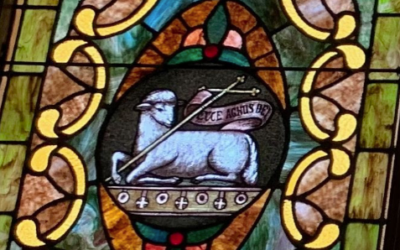What is your vegetable?
Sunday, October 18, 2020
Watch the service
Listen to the sermon

Read the sermon
What Is Your Vegetable?
The numbers keep dropping. In the last decade or so, we have had to come to terms with the fact that the number of people who call themselves, Christians, is dropping. In the last census the number of “nones” was growing and growing. America is described more and more as post-Christian. As Christians we need then to begin to ask how we will navigate life in this world when we are on the outside, looking in—when we are out-numbered. Thankfully, God’s word speaks to us fully and graciously. There are a number of books in the bible that tackle this issue. One of the best is the book of Daniel. We learn so much about life when Christianity is a minority when we read the book of Daniel. In the opening words of the book of Daniel, we read: “3 Then the king ordered Ashpenaz, chief of his court officials, to bring into the king’s service some of the Israelites from the royal family and the nobility— 4 young men without any physical defect, handsome, showing aptitude for every kind of learning, well informed, quick to understand, and qualified to serve in the king’s palace. He was to teach them the language and literature of the Babylonians. 5 The king assigned them a daily amount of food and wine from the king’s table. They were to be trained for three years, and after that they were to enter the king’s service. 6 Among those who were chosen were some from Judah: Daniel, Hananiah, Mishael and Azariah. 7 The chief official gave them new names: to Daniel, the name Belteshazzar; to Hananiah, Shadrach; to Mishael, Meshach; and to Azariah, Abednego.” (Dan. 1:3–7 NIV11-GKE)
As we begin these words, look at what was taken away from Daniel. First, his nation was taken from him. Because his own people, the Jews kept rebelling against the Lord and following their own desires instead of following the Lord, he let the Persians conquer them and enslave them. They were taken out of Israel and transplanted in Babylon. That was because of their own stubborn unbelief. Second, also what was taken away from Daniel was his name.
All this was taken away from Daniel. And notice what he does not do. He does not revolt. You would expect, that if anyone had a right to revolt, it would be Daniel. But he doesn’t. In fact, nowhere in the bible is there any right or reason to revolt. He does not raise an army and urge his friends to put Persians to death. He doesn’t revolt for several reasons: First, the government was God’s servant. So rebelling against it would be the same as rebelling against God. Second, this captivity was because of them. God allowed them to be captured because they rebelled against him. And finally, he didn’t revolt so that he could leave room for God’s wrath. So Christians do not revolt. But look at what happens in the words that follow: “8 But Daniel resolved not to defile himself with the royal food and wine, and he asked the chief official for permission not to defile himself this way. 9 Now God had caused the official to show favor and compassion to Daniel, 10 but the official told Daniel, “I am afraid of my Lord the king, who has assigned your food and drink. Why should he see you looking worse than the other young men your age? The king would then have my head because of you.” 11 Daniel then said to the guard whom the chief official had appointed over Daniel, Hananiah, Mishael and Azariah, 12 “Please test your servants for ten days: Give us nothing but vegetables to eat and water to drink. 13 Then compare our appearance with that of the young men who eat the royal food, and treat your servants in accordance with what you see.” 14 So he agreed to this and tested them for ten days.” (Dan. 1:8–14 NIV11-GKE)
Christians do not revolt. But they do resist. My dear friends in Christ, look at what Daniel did. He picked his battles. He found ways of saying “no” to the king that he could still keep his faith intact. And to begin with in his life, what was the hill he was willing to stand and die, if need be, on? Vegetables. We don’t know all the details. Maybe the meat that was offered to him was sacrificed to idols. Maybe it was ceremonially unclean. Maybe both. But that was the area that Daniel was willing to take his stand and not let his conscience be ground into nothingness.
And so, I want you this morning to ask yourself what your vegetable is? And, no, I’m not talking about what is in your garden still. Since it is true that Christians do not revolt, but they do resist, what is the area in your life that, if the government crossed that line, and you are being persecuted, you’d speak out and resist? I mention this because, one of the temptations we face as Christians is that we can fall off on either one side or the other when it comes to our obedience to the government. On the one hand, we can fail by saying to ourselves, “the government is God’s servant, so whatever they say we have to do.’” And we forget to give to God what is God’s. On the other hand, we can stand and die on every little hill when we do not need to. In a very sad way, the things of this world can become more important to us than the rich treasures of God’s word. So let me ask you again, “what is your vegetable?” What is the area of your life that you wil say, “If you take this away, then I’ll resist?’” And are you sure that that is the vegetable you should choose? Is that the area that it is wise to take your stand on?
If we ask what your vegetable is—where you will resist, how will you find out the answer? And that really gets at the heart of the issue. Here in God’s word is where you will find an answer to that question. Here among your fellow Christians, as you talk here on the way out of church and as you talk to each other in the middle of the week—there is where we find an answer to that question. So Christians do not revolt. But they do resist. How then do these words conclude? “15 At the end of the ten days they looked healthier and better nourished than any of the young men who ate the royal food. 16 So the guard took away their choice food and the wine they were to drink and gave them vegetables instead. 17 To these four young men God gave knowledge and understanding of all kinds of literature and learning. And Daniel could understand visions and dreams of all kinds. 18 At the end of the time set by the king to bring them into his service, the chief official presented them to Nebuchadnezzar. 19 The king talked with them, and he found none equal to Daniel, Hananiah, Mishael and Azariah; so they entered the king’s service. 20 In every matter of wisdom and understanding about which the king questioned them, he found them ten times better than all the magicians and enchanters in his whole kingdom. 21 And Daniel remained there until the first year of King Cyrus.” (Dan. 1:15–21 NIV11-GKE)
You’ll notice that they chose vegetable as their way and their place to take their stand. And the Lord did not abandon them. In fact, he blessed them. He gave them wisdom, health, and the ability to interpret dreams. Now, my friends in Christ, there are parts of this that do not apply to us. If we eat our veggies, there is no promise in scripture that says that we will gain wisdom and be able to interpret dreams. However there are several promise that God does give to us: First we remember that there is forgiveness. One of the difficult challenges we face is that sometimes we do not know if we’re supposed to take a stand at all. And only looking back do we see that we should have chosen our own vegetables. Or, the opposite is true, we took our stand and chose our vegetables. But we chose the wrong ones. So, yes, Christians do not revolt. And Christians resist when they have to. But finally, Christians remember. They remember Christ’s forgiveness won for them and brought to them. There are going to be times in our lives when it is not easy to figure out what choice to make. And when we make the wrong choice there is forgiveness for us.
So we remember Christ’s forgiveness. But we also remember Christ’s frustration. And here, when I use the word, frustration, I mean Christ frustrating the governments that go away from him and astray to destructive paths. We see this in Daniel’s time. The Assyrians beat up on the Jewish people. The Babylonians beat up on the Assyrians. The Greeks beat up on the Babylonians. The Romans beat up on the Greeks. As Martin Luther used to say, God often uses one ‘bad guy’ to beat up on another. And that is just one of the ways he frustrates the plans and desires of evil people who work as his servants in the government. It is good—so very good for us to look at the book of Daniel this morning. For, if you get caught up in the news, especially now, in the middle of these months of COVID and right before an election, it’s so easy get caught up in the headlines and to scream for justice. But first of all, we follow Daniel’s path. We ask for mercy. We see our own sins and the times we have neglected God’s word and God’s people. Then, when we see God’s great forgiveness given to us, we can take on the topic of God’s frustration. God will frustrate the plans of those in government who rage against him. And, at the end of the day, that will give us peace. Amen.



